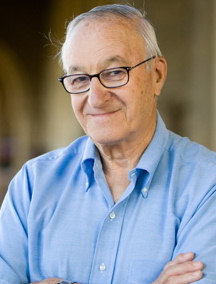
Albert Bandura is a psychologist and the David Starr Jordan Professor Emeritus of Social Science in Psychology at Stanford University. For the last 60 years, Bandura has researched and written about the causes of human behavior. He was the first to propose that the origins of personality are varied and complex and that they include the interaction of behavior with both environmental and innate—or inborn—factors.
Bandura was particularly interested in the ways that people influence the behavior, thoughts, and learning of others. His early work focused on modeling—learning through the observation of others. His classic Bobo doll experiment in the early 1960s demonstrated that children could mimic novel actions just by seeing an adult engage in them. This challenged existing beliefs that most learning occurred through conditioning or a system of reinforcement or punishment. The finding that learning could occur through simple observation has had significant implications, particularly for the development of children.
As he explored the effects and potential of modeling, Bandura began to wonder about the role of individuals’ beliefs about their ability to succeed at a task, or their sense of self-efficacy. This led to his development of social cognitive theory, which says that personality results from the interaction of an individual’s thoughts with inner qualities, self-beliefs, and environmental cues. His research determined convincingly that individuals who believe they can succeed at a task are more likely than others to actually succeed.
According to Bandura, “We find that people's beliefs about their efficacy affect the sorts of choices they make in very significant ways. In particular, it affects their levels of motivation and perseverance in the face of obstacles. Most success requires persistent effort, so low self-efficacy becomes a self-limiting process… To succeed, people need a sense of self-efficacy, strung together with resilience to meet the inevitable obstacles and inequities of life.”
For students, this self-efficacy coupled with the willingness to persist in the face of struggle are crucial for academic success. Students who have limited self-efficacy are less likely to continue to try because they don’t believe they can succeed, where students who have strong self-beliefs are more likely to continue to apply themselves. Continuing research in self-efficacy by Bandura and others demonstrates that, regardless of previous achievement or ability, students with higher self-efficacy work harder, continue to try for longer, persevere when faced with struggle, are more optimistic and less anxious, and achieve greater results.
Selected Publications
Bandura, A. (1977). Social Learning Theory. New York: General Learning Press.
Bandura, A. (1973). Aggression: A Social Learning Analysis. Englewood Cliffs, NJ: Prentice-Hall.
Bandura, A. (1986). Social Foundations of Thought and Action. Englewood Cliffs, NJ: Prentice-Hall.
Bandura, A. (1994). Self-efficacy. In V. S. Ramachaudran (Ed.), Encyclopedia of human behavior (Vol. 4, pp. 71-81). New York: Academic Press. (Reprinted in H. Friedman [Ed.], Encyclopedia of mental health. San Diego: Academic Press, 1998). Link
Bandura, A. (1997). Self-efficacy: The exercise of control. New York: W.H. Freeman.
Commentary
Foster, Christine. "Confidence Man." Stanford Magazine. September 2006
This article gives a thorough background of Albert Bandura and his significant contributions to the field of psychology.